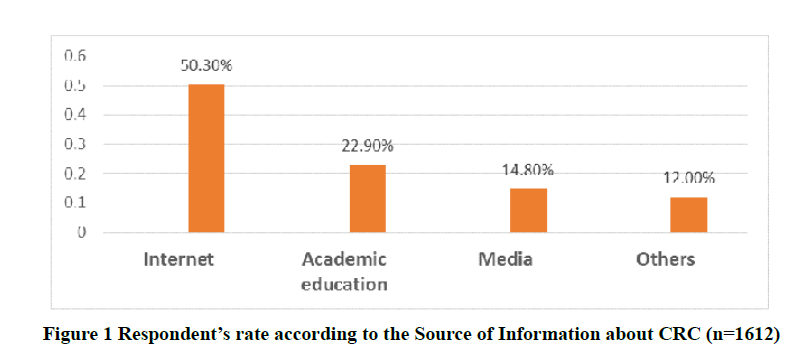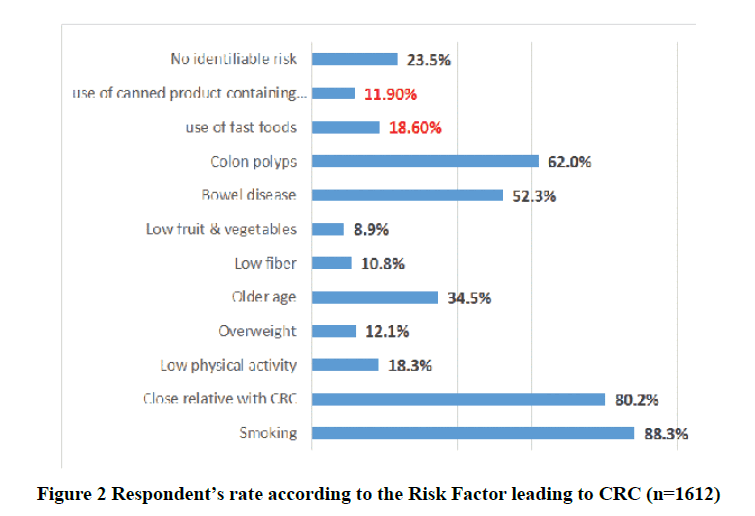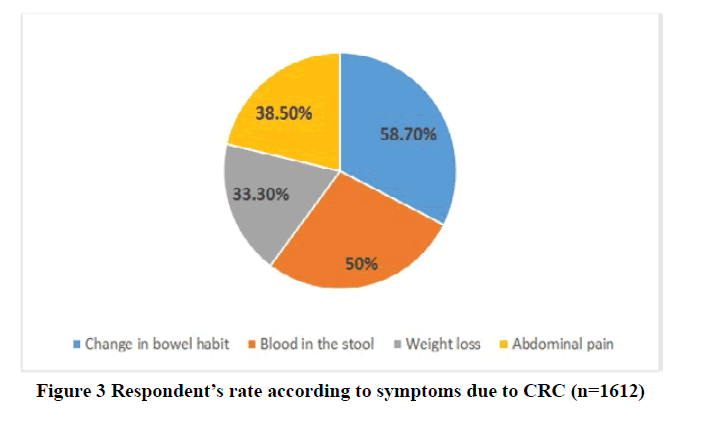Research - International Journal of Medical Research & Health Sciences ( 2021) Volume 10, Issue 5
Public Knowledge and Awareness of Risk Factors and Symptoms of Colorectal Cancer among Saudi General Population: A Population-Based Survey
Thamer H. Alghamdi1*, Abuobaida E. E. Abukhelaif2, Fares Gormallah A.Alghamdi1 and Alhassan Ali A. Alghamdi12Pathology Department, Faculty of Medicine, Albaha University, Saudi Arabia
Thamer H. Alghamdi, Department of General Surgery, Faculty of Medicine, Albaha University, KSA, Email: Thamerhg@hotmail.com
Received: 21-Apr-2021 Accepted Date: May 18, 2021 ; Published: 25-May-2021, DOI: O
Abstract
Introduction: In Saudi Arabia, CRC is the most common type of cancer among men and the third most common type among women. The highest rates of CRC were found to be in the regions of Dammam, followed by Riyadh, Makah, Qassim, and Tabuk.
Objective: This study aimed to assess the level of colorectal cancer awareness among the general population in Saudi Arabia.
Methodology: This was a community-based cross-sectional study conducted from April to May 2020. An online administered questionnaire was used for data collection and SPSS (version 24) was used for data analysis.
Result: A total of 1612 respondents (819 males and 793 females) were recruited for the study. The participants aged from 18 to 65 years and most of them were married (71.5%). The majority had inadequate knowledge about colorectal cancer. Among our respondents, half of them (52.1%) had heard the term “CRC”. The majority of them (85.5%) had not been diagnosed with CRC and about two-thirds of the participants (63.5%) did not know anyone with CRC. Less than half (40.9%) of the respondents don’t know whether CRC is contagious or not, and about thirds reveal that it is not contagious. Around two-thirds (61.8%) of the participants revealed no idea about the preventable nature of CRC and only (14.2%) believe that colorectal cancer is preventable and half of them (49.4%) believe that it is treatable and 35.3% revealed that CRC could be fatal.
Conclusion: In conclusion, there are low levels of knowledge of CRC, about awareness of its symptoms and risk factors. There is a necessity for educational creativities and awareness campaigns to increase the general public’s awareness of CRC symptoms and risk factors in Saudi Arabia.
Keywords
Colorectal cancer, Saudi Arabia, Awareness, Risk factors
Introduction
Colorectal Cancer (CRC) represents a high disease problem globally, and it has been estimated to extra increase by 60% by the year 2030, ranked as the third most common cancer among men and the second most among women worldwide [1,2]. In Saudi Arabia, CRC is the most common type of cancer among men and the third most common type among women [3-8]. The highest rates of CRC were found to be in the regions of Dammam, followed by Riyadh, Makah, Qassim, and Tabuk [7].
According to the SEER Cancer Statistics Review (CSR) 1975-2014, about two-thirds of Saudi male and female CRC cases are detected at a late stage (stage 3 or 4) thus leading to an amplified risk of cancer death [8,9]. The disease incidence increases with age; which is often seen in people aged 50 and older, late presentation is related to low cancer awareness and misconceptions about cancer. Individual’s knowledge and awareness about disease affect the self-care practices towards their illness; the more they know about their illness, the more they would have self-management skills. Raising awareness about CRC risk factors might give clue to the general population to be further involved in screening as a result of improved knowledge about the disease [10,11]. Several studies revealed that the awareness of CRC symptoms and risk factors is related to the acceptance of CRC screening [12-14].
Collaborators from the University of Albaha, Faculty of Medicine and the Ministry of Health Saudi Arabia (MoH) planned and carry out the Colorectal Cancer Awareness Month Campaign on March 1st to 31st, 2020, aimed at promoting colorectal cancer early detection and prevention awareness, raising awareness about the risk factors of colorectal cancer and supporting patients with colorectal cancer, those improved from it, and their families.
According to the literature the level of knowledge and awareness among the general public regarding CRC in some of the Saudi regions and Albaha, in particular, was unsatisfactory, so we aimed by this study to measure the level of knowledge among the Saudi population regarding the general awareness, risk factors and symptoms of CRC
Materials and Methods
Study Design
This was a community-based cross-sectional study through an online self-administered questionnaire study that was distributed using Google Docs to measure awareness regarding CRC among the Saudi general public conducted from 1 April to 30 May 2020.
Questionnaire Development and Validation
The survey was designed by the principal author and to develop the questionnaire a thorough searching of the previously validated published studies that were conducted on public and healthcare awareness of CRC using the following keywords: CRC, public awareness, opinion, and attitudes. From the findings, questions were adapted to fit the objectives of our study. The final version of the questionnaire was translated into the Arabic language to make it easy and understandable for the general public to answer the questions properly. A pilot test was done among 40 random general Saudi adults to validate the survey questionnaire which consisted of the following parts (demographic data of the respondents, general knowledge and awareness about CRC, its risk factors, and symptoms).
Data Analysis
Data gathered through the online investigation from the Google Docs were downloaded as an SPSS file and were checked for completeness. Inadequate and empty replies were omitted from the analysis. The possibility of duplication among participants was addressed by checking the IP number together with the timestamps, the exact similarity of the data, and responses by doing data sorting on Microsoft Excel (MS Excel) 2013, version 3, (Jones, Chicago, Illinois, USA). Data were encoded and analyzed using the Statistical Package for the Social Sciences (SPSS) version 24 (IBM, SPSS Inc., Armonk, NY, USA). Frequencies and percentages were created for categorical variables, while mean and standard deviation were calculated for quantitative variables. Pearson’s correlation was done to determine correlations between variables. An independent t-test was done for continuous variables to determine the significance between two groups, and for categorical variables, a Chi-square test was used. p<0.05 was considered statistically significant.
Results
One thousand six hundred and twelve Saudi adults voluntarily respond to the questionnaires that were disseminated among the Saudi general population in our community-based study.
The sample consists of an almost equal distribution of males and females (50.8% vs. 49.2%) with a mean age of 28.8 (18-45) years and 70% were married. Most of the participants were educated (93%) as shown in Table 1 with 67.9% had university education especially males (81%) who had attained higher levels of education comparable to females.
| Patterns | Frequency/Percentage (n/%) | p-value |
|---|---|---|
| Age | ||
| <18 | 44 (2.7) | 0.000 |
| 18-45 | 1314 (81.5) | |
| >45 | 254 (15.8) | |
| Sex | ||
| Male | 819 (50.8) | 0.517 |
| Female | 793 (49.2) | |
| Nationality | ||
| Saudi | 1533 (95.1) | 0.000 |
| Non-Saudi | 79 (4.9) | |
| Residence | ||
| Al Baha | 1011 (62.7) | 0.000 |
| Others | 601 (37.3) | |
| Education level | ||
| Primary | 8 (0.5) | 0.000 |
| Secondary | 28 (1.7) | |
| Higher | 278 (17.2) | |
| Bachelor and Post | 1298 (80.5) | |
| Marital Status | ||
| Married | 1152 (71.5) | - |
| Single | 460 (28.5) | |
p<0.05: Statistically significant, p>0.05: Statistically insignificant
Table 1: The demographic data of the study participants, n=1612
Knowledge and Awareness Regarding Colorectal Cancer (CRC)
Table 2 below show the responses of our study population regarding knowledge and awareness concerning CRC. Among our respondents, half of them (52.1%) had heard the term “CRC”. Half of those who heard about CRC, reveal that their source of information about CRC was from social media through the internet (online resources) as the majority of them (85.5%) had not been diagnosed with CRC and about two-thirds of the participants (63.5%) did not know anyone with CRC.
Less than half (40.9%) of the respondents don’t know whether CRC is contagious or not, and about thirds reveal that it is not contagious. Around half of respondents (49.4%) believe that CRC is treatable and 35.3% revealed that CRC could be fatal.
Source of Information about Colorectal Cancer (CRC)
Regarding the source of information about CRC, among the respondents who were aware of CRC the most reported source of information was found to be from the internet (50.3%; p=0.033); academic education (22.9%; p=0.011); journals, and newspapers (media) (14.8%; p=0.398) and other resources (12% p=0.015) such as family members and friends including cancer awareness campaigns and physicians as shown in Figure 1.
Knowledge of Colorectal Cancer Risk Factors among the Study Population
Questioning about the risk factors leading to CRC among our respondents, as shown in Table 2 above the overall awareness regarding CRC risk factors was found to be 61.2%. Smoking was the most commonly identified risk factor (88.3%; p<0.001, followed by family history (80.2%; p<0.001), colonic polyp (62%; p=0.368). However, about 23.5% of the respondents their response was “there are no identified causes of CRC,” (p=0.509) as shown in Figure 2 below.
| General knowledge items | (%) |
|---|---|
| Have you ever heard about CRC | |
| Yes | 52.1% |
| No | 41.40% |
| Don’t know | 6.5% |
| Have you been diagnosed with CRC | |
| Yes | 14.5% |
| No | 85.5% |
| Do you know anyone who has CRC | |
| Family member | 11.0% |
| Relative | 16.5% |
| Friends | 9.5% |
| Don’t know | 63.0% |
| CRC is contagious | |
| Yes | 19.5% |
| No | 37.8% |
| Don’t know | 40.9% |
| CRC can be treated | |
| Yes | 49.4% |
| No | 27.3% |
| Don’t know | 23.3% |
| Is CRC fatal? | |
| Yes | 35.3% |
| No | 21.2% |
| Don’t know | 43.5% |
| Do you know there are risk factors for CRC | |
| Yes | 61.2% |
| No | 36.1% |
| Don’t know | 12.7% |
Table 2: General knowledge items regarding CRC among the study participants, n=1612
Knowledge of Colorectal Cancer symptoms among the Study Population
Of the 1612 respondents Figure 3 Showed that among our respondents the importance of these symptoms included: change in bowel habits such as constipation, and diarrhea (58.7%; p<0.001) blood in the stool (50%; p<0.001), abdominal pain (38.5%; p=0.129), and weight loss (33.3%; p=0.426).
Discussion
To construct an effective national colorectal cancer learning program to the aware general population about the disease, it is crucial to have a clear picture of what do public knows about this disease and their level of awareness towards the program. It is well recognized that lack of colorectal cancer awareness among the population can have destructive effects on time to presentation and, of course consequently, on general wellbeing [15-18]. Thus the bulk of cases and deaths from this disease can be stopped by applying obtainable awareness about cancer prevention [19]. Our study aimed to evaluate the level of knowledge and awareness among the Saudi general public regarding the symptoms and risk factors for Colorectal Cancer (CRC) and from this study, awareness among the studied population on colorectal cancer was found to be unsatisfactory. This is based on a high percentage of respondents among our respondents (47.9%) who had not heard the term “CRC”.This may be due to the finding that the main sources of information among our respondents were the internet including social media while academic sources and awareness campaigns despite their importance they represent only 22% and 12% respectively as a source of information related to CRC. Again two thirds (61.8%) of the participants revealed no idea about the preventable nature of CRC and only (14.2%) believe that colorectal cancer is preventable and half of them (49.4%) believe that it is treatable and 35.3% revealed that CRC could be fatal. In addition, overall awareness regarding CRC risk factors was found to be 61.2% including the low level of colorectal presenting symptoms.
Similar to our study, several previous studies in many countries revealed low levels of knowledge of CRC, about awareness of its symptoms and risk factors such as in Iran, Malaysia, Hong Kong, American Indians, and Australia [20-24].
Conclusion
In conclusion, our present study focused only on the knowledge regarding symptoms and risk factors of CRC. However, it is enthusiastic to further search through additional investigation the barriers, initiators, and the readiness to share in CRC screening among the population. To define the actual barriers and initiators will permit for the development of strategies that will report to a range of professional healthcare workers of ways to stimulate individuals at risk to share in a screening program.
Furthermore, our findings from this study characterize a firm base for the policymakers and educators to direct their determinations decisively toward the setting up of preventive practices and disease early detection strategies. Finally, there is a necessity for educational creativities and awareness campaigns to increase the general public’s awareness of CRC symptoms and risk factors in Saudi Arabia.
Declarations
Conflicts of Interest
The authors declared no potential conflicts of interest with respect to the research, authorship, and/or publication of this article.
References
- Arnold, Melina, et al. "Global patterns and trends in colorectal cancer incidence and mortality."Gut,Vol. 66, No. 4, 2017, pp. 683-91.
- Bray, Freddie, et al. "Global cancer statistics 2018: GLOBOCAN estimates of incidence and mortality worldwide for 36 cancers in 185 countries."CA: A Cancer Journal for Clinicians,Vol. 68, No. 6, 2018, pp. 394-424.
- Althubiti, Mohammad A., and Mohamed M. Nour Eldein. "Trends in the incidence and mortality of cancer in Saudi Arabia."Saudi Medical Journal,Vol. 39, No. 12, 2018, pp. 1259-62.
- Herzallah, Hatem K., et al. "Temporal trends in the incidence and demographics of cancers, communicable diseases, and non-communicable diseases in Saudi Arabia over the last decade."Saudi Medical Journal,Vol. 40, No. 3, 2019, pp. 277-86.
- Ferlay, J., et al. "GLOBOCAN 2012 v1. 0, Cancer incidence and mortality worldwide: IARC CancerBase No. 11 [Online]. Lyon, France: International Agency for Research on Cancer." 2013.
- World Health Organization. "International Agency for research on Cancers." 2018. https://gco.iarc.fr/today/data/factsheets/populations/682-saudi-arabia-fact-sheets.pdf
- Howlader, N. N. A. K. M., et al. "SEER cancer statistics review, 1975-2013."Bethesda, MD: National Cancer Institute,Vol. 19, 2016.
- Al-Shahrani Z, Al-Rawaji A, Al-Madouj A, Hayder M. "Cancer Incidence Report 2014." Saudi Cancer Registry, 2017.
- Zubaidi, Ahmad M., et al. "Public awareness of colorectal cancer in Saudi Arabia: A survey of 1070 participants in Riyadh."Saudi Journal of Gastroenterology: Official Journal of the Saudi Gastroenterology Association,Vol. 21, No. 2, 2015, pp. 78-83.
- Su, Tin Tin, et al. "Level of colorectal cancer awareness: A cross sectional exploratory study among multi-ethnic rural population in Malaysia."BMC Cancer, Vol. 13, No. 1, 2013, pp. 1-8.
- Schliemann, Désirée, et al. "Effectiveness of mass and small media campaigns to improve cancer awareness and screening rates in Asia: A systematic review."Journal of Global Oncology,Vol. 5, 2019, pp. 1-20.
- Tseng, Tung-Sung, et al. "Predictors of colorectal cancer knowledge and screening among church-attending African Americans and Whites in the Deep South."Journal of Community Health,Vol. 34, No. 2, 2009, pp. 90-97.
- Post, Douglas M., et al. "Determinants of colorectal cancer screening in primary care."Journal of Cancer Education,Vol. 23, No. 4, 2008, pp. 241-47.
- Ibrahim, Ezzeldin M., et al. "Past, present and future of colorectal cancer in the Kingdom of Saudi Arabia."Saudi Journal of Gastroenterology: Official Journal of the Saudi Gastroenterology Association,Vol. 14, No. 4, 2008, pp. 178-82.
- Mitchell, E., et al. "Influences on pre-hospital delay in the diagnosis of colorectal cancer: A systematic review."British Journal of Cancer,Vol. 98, No. 1, 2008, pp. 60-70.
- Macdonald, Sara, et al. "Systematic review of factors influencing patient and practitioner delay in diagnosis of upper gastrointestinal cancer."British Journal of Cancer,Vol. 94, No. 9, 2006, pp. 1272-80.
- Macleod, Una, et al. "Risk factors for delayed presentation and referral of symptomatic cancer: Evidence for common cancers."British Journal of Cancer,Vol. 101, No. 2, 2009, pp. S92-101.
- Richards, M. A., et al. "Influence of delay on survival in patients with breast cancer: A systematic review."The Lancet,Vol. 353, No. 9159, 1999, pp. 1119-26.
- Wong, Martin CS, et al. "The knowledge of colorectal cancer symptoms and risk factors among 10,078 screening participants: Are high risk individuals more knowledgeable?"PloS One,Vol. 8, No. 4, 2013, p. e60366.
- Harmy, M. Y., et al. "Knowledge and attitude of colorectal cancer screening among moderate risk patients in West Malaysia."Asian Pacific Journal of Cancer Prevention: APJCP,Vol. 12, No. 8, 2011, pp. 1957-60.
- Christou, Aliki, and Sandra C. Thompson. "Colorectal cancer screening knowledge, attitudes and behavioural intention among Indigenous Western Australians."BMC Public Health,Vol. 12, No. 1, 2012, pp. 1-16.
- Salimzadeh, Hamideh, et al. "Knowledge and practice of iranians toward colorectal cancer, and barriers to screening."International Journal of Preventive Medicine,Vol. 3, No. 1, 2012, pp. 29-35.
- Haggar, Fatima A., and Robin P. Boushey. "Colorectal cancer epidemiology: Incidence, mortality, survival, and risk factors."Clinics in Colon and Rectal Surgery,Vol. 22, No. 4, 2009, pp. 191-97.
- Javanparast, Sara, et al. "Barriers to and facilitators of colorectal cancer screening in different population subgroups in Adelaide, South Australia."Medical Journal of Australia,Vol. 196, No. 8, 2012, pp. 521-23.



